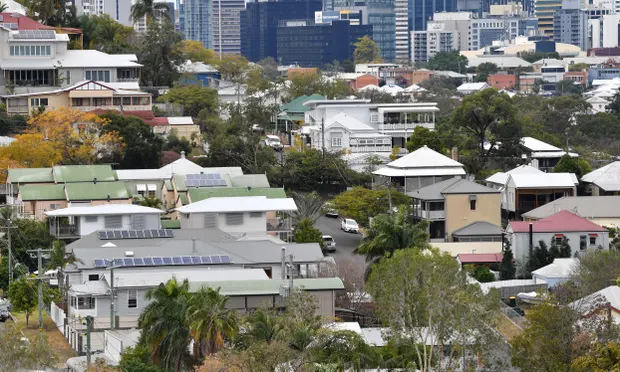Agency claims most tenants ‘are agreeable’ to the rent increases, which Tenants Queensland calls ‘opportunistic price-gouging’
A Brisbane real estate agency has urged landlords to consider raising rents by more than 20%, as Australia grapples with a worsening rental crisis.
An email, sent by Ray White West End, asked landlords if their properties were being “under-rented” before advising them to increase rents by more than double the rate of inflation.
It comes before the Queensland government is set to hold a housing summit this week to deal with rising homelessness and rental stress.
The email said the agency was finding that “many landlords are not being provided with the information to make an informed decision” and were being advised to sign long-term leases with rent increase of only $5 to $20 a week.
“Our property managers have been reviewing all our lease renewals and on average recommending a 17% rent increase on the leases renewed in October & November this year,” the email said.
“As we are planning December lease renewals, the average lease renewal recommendation is above 20%. This can be as much as $10,000 per year in additional rental income.”
The agency claimed most tenants “are agreeable” to the rent increases, saying when they “look at what is available in the market for rent, they understand” that it is “fair and reasonable”.
“On average, apartments in West End/Highgate Hill/South Brisbane/Brisbane CBD are renting for one bedroom $480 to $520+ [a week and for] two bedrooms $675 to $850+ [a week],” the email said.
“If you are not achieving these rents (at a minimum), you should be asking why?”
The chief executive at Tenants Queensland, Penny Carr, said the email shows the “opportunistic price-gouging” that is occurring across Australia with rent increases.
“Rents are unaffordable for people at the moment and tenants are having to absorb increases because of fear of not finding another property or becoming homeless,” she said.
“We should only allow rent increases above CPI if they’re justifiable and there’s been major work to the property or something’s had to be replaced.”
Carr said the email dispels the myth that the land tax proposed by the Queensland government for interstate investors would have supercharged rent increases.
“Rents have been going up phenomenally for the last 18 months and that’s because of vacancy rates and supply and demand,” she said.
She said the introduction of a landlord register would provide more transparency for the state government, providing them with information to guide policy.
When asked about the proposed increases, the principal realtor at Ray White West End, Luke O’Kelly, said rental affordability “will worsen if investors lose confidence in the Brisbane housing market”.
“Over the past 12 months, Brisbane has had some of the strongest population growth in the country and this has most clearly shown up in rental growth,” O’Kelly said.
“Right now, Brisbane doesn’t have enough homes for those that want to live here … with rents rising so quickly, Brisbane needs more property investors.”
O’Kelly said population growth and flooding, had pulled “properties out of the rental market.”
“It was therefore a relief that the state government recently pulled back on proposed changes to land tax which would’ve discouraged interstate investors,” he said.
Australians paid an extra $7.1bn in rent over the past year, with the average renter spending $62 more a week than they did a year ago, or more than $3,000 a year.
The Greens housing and homelessness spokesperson, Max Chandler-Mather, said the email showed urgent intervention is needed to protect tenants against unfair rent increases.
“It’s this sort of flagrant price-gouging that demonstrates exactly why we need a national two-year freeze on rent increases,” he said.
Queensland’s minister for housing has been contacted for comment.
… we have a small favour to ask. Millions are turning to the Guardian for open, independent, quality news every day, and readers in 180 countries around the world now support us financially.
We believe everyone deserves access to information that’s grounded in science and truth, and analysis rooted in authority and integrity. That’s why we made a different choice: to keep our reporting open for all readers, regardless of where they live or what they can afford to pay. This means more people can be better informed, united, and inspired to take meaningful action.
In these perilous times, a truth-seeking global news organisation like the Guardian is essential. We have no shareholders or billionaire owner, meaning our journalism is free from commercial and political influence – this makes us different. When it’s never been more important, our independence allows us to fearlessly investigate, challenge and expose those in power.

































